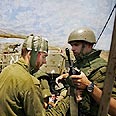
Looking for victory
What happens when the ground campaign achieves its goals, but Hizbullah is still standing?
For the past week the IDF has been "advising" Lebanese civilians south of the Litani River to leave the area. In recent days, the air force has fired several warning shots to "encourage" residents to leave.
Yesterday, attempts to "convince" the locals to leave were even more specific, an d leaflets were dropped on 13 villages, intended to show the extent of targets the IDF plans on attacking in the framework of the "limited" ground war in south Lebanon.
Preparations for the ground war began in the middle of last week. These preparations found public expression when the first reserve unites were activated to replace standing army units pulled from the Territories and shipped to the north. Up on the northern border, the IDF northern command prepared differently.
To avoid associations that we are "once again getting bogged down in Lebanon," the army is saying that armored battle teams are performing a limited operation south of the Litani River for extremely limited periods, similar to the limited actions being carried out in Gaza. It's all true.
Fewer limits
But as opposed to Gaza, the ground forces that went into south Lebanon over the weekend are acting like they are moving against the military establishments of an enemy army – like Syria, for example.
That means the limitations observed when entering civilian-populated areas in Gaza are not being observed in south Lebanon. Friday, when that the Maroun al-Ras neighborhood "floating armor" – a rocket that carries multiple pay loads that can clear mines for distances of up to 120 meters. One barely need note that the explosion leaves nothing alive.
The battle plan is necessarily slow, methodical, by the book, for a conventional enemy. If they need artillery to provide a fire screen ahead of ground troops, air escorts or they need the air force to "soften up" a city – they are ready. That's the concept.
Therefore, they warn the civilian population again and again to leave. This type of operation could lead to many, many casualties.
Ready for war
Hizbullah is waiting for the ground war. The organization has mined all access routes (the explosion that destroyed a Merkava tank the day of the kidnapping was approximately a half-ton of TNT). Hizbullah is armed with the best Iranian and Syrian weapons. They have the last word with regard to anti-tank missiles that Russia provided to Syria.
For example, the Cornet missile that penetrated another Merkava and wounded two crew members. They also have advanced RPG-29 anti-tank weapons, night-vision ability and more.
IDF forces could encounter mortar fire, Katushyas and snipers. Hizbullah will try to raw Israel into close-range combat in crowded, maze-like areas.
Israel: Two advantages
To combat Hizbullah's advantage in guerilla fighting Israel has two relative advantages: technology and intelligence. Technology gives Israel the ability to strike exact targets from long-ranges and a great deal of defense. And Israel's intelligence ability is meant to provide a good picture of the enemy and to provide, in real time, targets.
Hizbullah feels it has an advantage in a ground war, as opposed to its inability to respond to Israel's air superiority. In order not to fall into the traps Hizbullah has set – and there are many such traps – troop movement must be very well planned, cautious. There must be no sign of fire.
No one is putting time limits on the army. No one expects hasty action. The American administration's announcement over Shabbat was a message to the entire world: Go ahead, keep hitting the. We'll cover the ammunition.
What if we succeed but don't win?
This action of "cleaning out" Hizbullah positions is expected to conclude by the end of the week. The ground campaign was born because 10 days of intensive air strikes failed to achieve a breaking point. The point from which it would be possible to begin a process of acceptable "arrangements." In order to prevent the enemy from getting used to the current situation of air strikes we needed to add a new element: ground attacks.
But south Lebanon continues to function autonomously. Katushya fire has continued, despite strikes against roads, media outlets, command centers and more in the north.
Now, there is hope that this addition of ground forces will be able to achieve that "breaking point," so that in another week there will be favorable terms for a political settlement: No Hizbullah control south of the Litani River, and it will be possible to talk about another international force to take Hizbullah's place in that region.
But it is also possible that attaining all the ground goals in south Lebanon will not bring about a halt to Hizbullah's attacks, that Katushyas will continue to fly from north of the Litani and Hizbullah will come out of the campaign standing. It is also unlikely that international diplomatic forces will intervene.
So what then? Do we go back to asking, "what now?" Do we trudge along? Look for another element? Begin another chapter?










